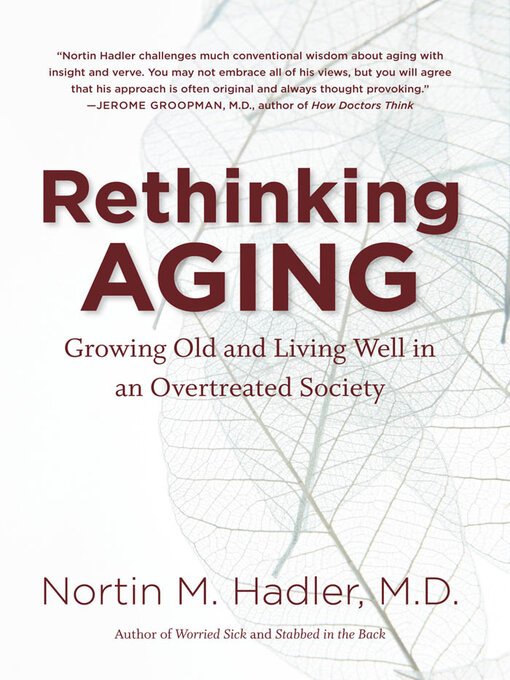Rethinking Aging
Growing Old and Living Well in an Overtreated Society
Over the past decades, Hadler has established himself as a leading voice among those who approach the menu of health-care choices with informed skepticism. Only the rigorous demonstration of efficacy is adequate reassurance of a treatment's value, he argues; if it cannot be shown that a particular treatment will benefit the patient, one should proceed with caution. In Rethinking Aging, Hadler offers a doctor's perspective on the medical literature as well as his long clinical experience to help readers assess their health-care options and make informed medical choices in the last decades of life. The challenges of aging and dying, he eloquently assures us, can be faced with sophistication, confidence, and grace.
-
Creators
-
Publisher
-
Release date
September 12, 2011 -
Formats
-
Kindle Book
-
OverDrive Read
- ISBN: 9780807869239
- File size: 2553 KB
-
EPUB ebook
- ISBN: 9780807869239
- File size: 2553 KB
-
-
Languages
- English
-
Reviews
-
Publisher's Weekly
May 30, 2011
We now know exactly where we are at a "ripe old age"âabout 85, and more of us are hitting that mark than ever before, notes Hadler, a professor of medicine at UNCâChapel Hill (Worried Sick: A Prescription for Health in an Overtreated America). But it's all downhill and at a fairly quick clip after that. And here's where Hadler moves into myth-buster mode, arguing that it's not useful to hope that biotechnology will stave off the grim reaper. Better to live the old lives we reach by making smart decisions as we travel there, e.g., ignoring media hype about "the scare of the week, the miracle of the month," and be wary of road maps to impossibly golden years. Hadler cites controversial studies showing, for instance, that there is no obesity epidemic. He also cautions against the growing array of screening tests: unlike diagnostics that look for an existing problem, screening hunts for culprits that could create a future problem that may never materialize. With this thoughtful guide, Hadler urges better options for end-of-life care than a lonely, traumatic last stop at the hospital. -
Library Journal
August 1, 2011
Hadler (medicine & microbiology/immunology, Univ. of North Carolina-Chapel Hill; Worried Sick: A Prescription for Health in an Overtreated America) decries the overmedicalization of aging, arguing that many natural conditions, such as osteoarthritis and osteoporosis, have been redefined as diseases. This has led to unnecessary screening resulting in aggressive (and expensive) treatments that often do more harm than good. Reviewing epidemiological studies, he demonstrates that even simple interventions after age 60, such as lowering blood pressure through diet and drugs, do not significantly contribute to a longer, healthier life. Hadler advocates informed decision making pertaining to all stages of aging, cautioning that no procedure should be undertaken unless evidence clearly indicates outcomes will be beneficial. He also shows that racial, gender, and socioeconomic factors significantly affect longevity, a point also made by Susan Jacoby in her more readable Never Say Die. VERDICT Hadler's view of aging is cautionary; written in a technical style, it is an elaboration on and slight updating of topics covered in his previous works.--Lucille M. Boone, San Jose P.L., CA
Copyright 2011 Library Journal, LLC Used with permission.
-
Formats
- Kindle Book
- OverDrive Read
- EPUB ebook
subjects
Languages
- English
Loading
Why is availability limited?
×Availability can change throughout the month based on the library's budget. You can still place a hold on the title, and your hold will be automatically filled as soon as the title is available again.
The Kindle Book format for this title is not supported on:
×Read-along ebook
×The OverDrive Read format of this ebook has professional narration that plays while you read in your browser. Learn more here.


